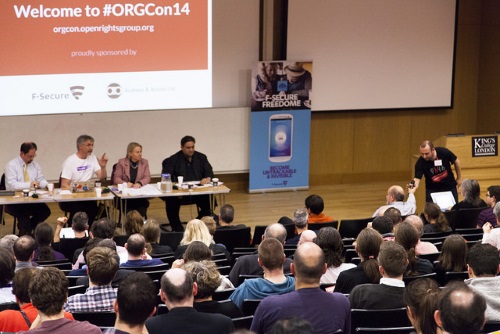Still at orgcon14, the first session in the afternoon was titled “Campaigning with Politicians”. I wasn’t going to report this since on the whole it wasn’t that good, but it does set the scene for what may be coming and so I changed my mind. The chair opened the session by stating the session would be best used as a campaigning symposium and not treated as a hustings, he might have saved himself the trouble. The three speakers, Jullian Huppert MP (LibDem), Natalie Bennett (Green Party) and Claude Moraes MEP set out their (Parties’) stalls.
Huppert has had to learn some humility and this year asks us to examine MP’s record and position; he needs to because very few people will accept his boastful claims from last year that the LibDems were the only guarantee against mass surveillance. He justified his personal support for DRIP on the grounds that the LibDem vote didn’t count because the Tories had stitched up the (Labour) Opposition and that there were Tories who would have opposed the civil liberty improvements, the proposed supervision and sunset clauses. This doesn’t make sense! These were only in the table because back bench MPs opposed the front bench collusion.
Corey Doctrow announced his joining the Greens and threw a soft ball question on parliamentary whipping suggesting it was a major part of the problem, referencing the DE Bill/Act vote in 2010. Other speakers spoke of the DRIP stitch up and suggested that Parliament’s failure to represent the voters against the surveillance state could only be solved with a more proportionate voting system. I have some sympathy with this, and the support for PR seems to be growing, at least amongst the politically active. This would probably mean more UKIP and Green MPs. It’d be interesting to see what the UKIP position on surveillance and data retention would be; presumably against when the EU Directive mandated it, and for it once the EU Court prohibits the data collection.
I have thought long and hard on the question of party whips since seeking to be one of Labour’s EP candidates. A candidate that stands as a Party candidate makes a promise to their voters and so does the Party that allows the label to be used. The collective nature of the promise is a protection for voters; if they vote for a Party candidate and its manifesto then they know that the Party will help keep their representatives to account. When the whip is used without mandate then it’s a violation of the implicit contracts and representatives have a right (and maybe duty) to vote the way they think interprets their mandate most accurately. At its best, a parliamentary whip is merely advice. Coalition is not an excuse as a number of LibDems will discover. Bennett stated that the Greens don’t whip, but with only 1 MP that doesn’t matter, and I’d be interested as to what advice she (Lucas) takes from her extra-parliamentary national leadership.
Huppert in his desperation brought up the votes on the Digital Economy Act neglecting to mention that it was LibDem peer who introduced the clauses on web blocking, that Clegg’s promise on repeal was categoric and that in this parliament the LibDem’s have supported web filtering and increased surveillance. He also neglected to mention that 23 Labour MPs broke a three line whip to vote against it, more than the number of LibDems that could be bothered to turn up to vote for their whip, suggesting to me that if you want an MP that thinks for themself and will vote against a whip, a party other than the LibDems might be your choice. Huppert will have to learn that people listen to what is said and remember.
I was interested that Huppert (I think) suggested that one answer to the security or privacy is that we might still be able to have more of both. i.e. he suggests that we are in a position that we are not on the security/privacy pareto boundary. You can’t be wrong all the time.
ooOOOoo
Published on 7th Dec and backdated to the time of occurrence. The Westminster picture is mine and at flickr cc by-sa, the conference picture is ORG’s
